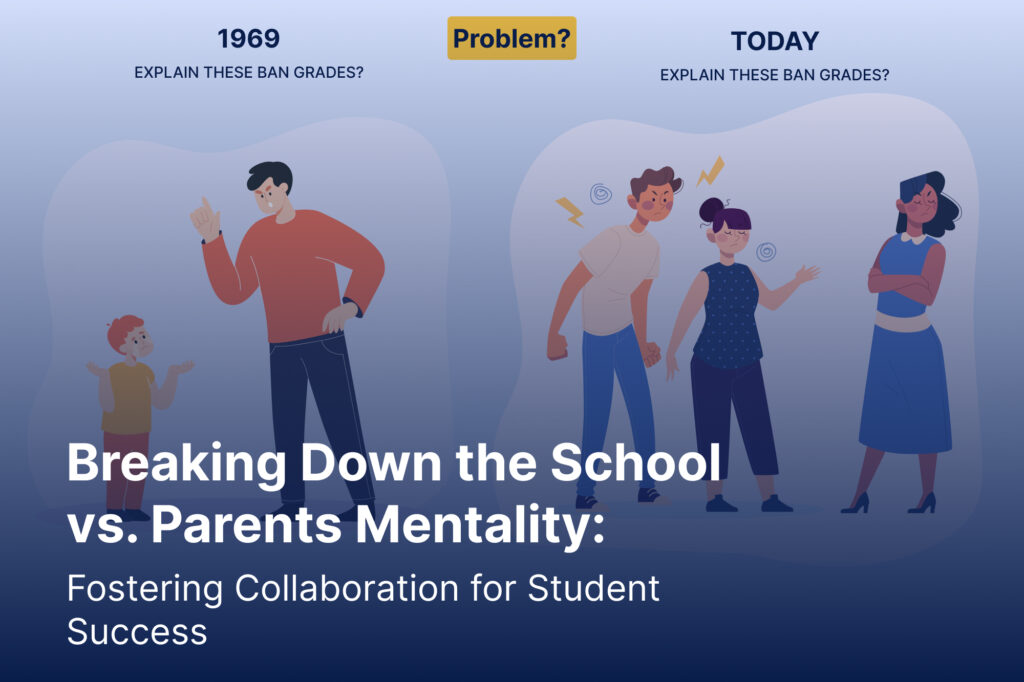Within the vast landscape of education, a longstanding and deeply entrenched schism persists: the notion of an inherent schism between schools and parents. This entrenched “School vs. Parents” paradigm, often characterized by adversarial dynamics and a sense of mutual distrust, serves as a formidable barrier to the cohesive collaboration essential for fostering student achievement and well-being. This divisive mindset not only hampers the collective efforts aimed at nurturing the next generation but also perpetuates an atmosphere of discord and disconnection within the educational ecosystem. Therefore, the imperative of our time lies in dismantling this detrimental mindset and cultivating a transformative culture of genuine partnership between schools and parents.
Embedded within the fabric of education, like an enduring rift, is the pervasive notion of a dichotomy between schools and parents. This deeply ingrained “School vs. Parents” mentality, with its roots tracing back through generations, has fostered an environment characterized by friction, misunderstanding, and a lack of synergy. Instead of viewing schools and parents as allies in the shared mission of nurturing the minds and souls of our youth, this divisive mindset often positions them as adversaries, each vying for control or authority over the educational journey of the child.
This adversarial stance, perpetuated by historical norms and reinforced by societal narratives, breeds an atmosphere of mistrust and defensiveness, inhibiting the open exchange of ideas and collaboration essential for meaningful progress. It erects barriers where there should be bridges, fostering a sense of isolation and alienation among stakeholders who should be united by a common purpose.
Yet, amid this prevailing discord, there exists an opportunity for transformation—a chance to break free from the shackles of outdated paradigms and forge a new path forward based on principles of cooperation, respect, and mutual understanding. It is time to reimagine the relationship between schools and parents not as a battleground for control, but as a fertile ground for partnership and collaboration.
By embracing this shift in perspective, schools and parents can unlock a wealth of untapped potential, pooling their collective expertise, insights, and resources to create an educational ecosystem that is truly holistic and inclusive. Together, they can cultivate environments where every child feels supported, valued, and empowered to reach their fullest potential, academically, socially, and emotionally.
Thus, the call to action is clear: it is time to dismantle the walls that divide us and build bridges that unite us in our shared commitment to the well-being and success of our children. Let us cast aside the outdated “School vs. Parents” mindset and embrace a new era of partnership—one characterized by collaboration, empathy, and a shared vision for the future of education.
Understanding the Divide:
The School vs. Parents mentality is often rooted in a complex interplay of factors that contribute to misunderstandings, mistrust, and misalignment of perspectives. To address this divide effectively, it is essential to delve deeper into its underlying causes:
- Communication Challenges: One of the primary contributors to the divide between schools and parents is communication breakdowns. Schools may struggle to effectively communicate with parents, whether due to limited resources, language barriers, or a lack of understanding of parents’ communication preferences. Conversely, parents may feel unheard or marginalized, leading to frustration and disengagement from the educational process.
- Perceived Power Imbalance: The perceived power imbalance between schools and parents can exacerbate tensions and reinforce the divide. Parents may feel intimidated or marginalized by the authority of educators and administrators, leading to a reluctance to voice their concerns or engage in collaborative efforts. Similarly, schools may struggle to balance the need for parental involvement with concerns about overstepping boundaries or encountering resistance.
- Cultural and Socioeconomic Differences: Socioeconomic and cultural differences between schools and parents can also contribute to the divide. Families from marginalized or underserved communities may face unique challenges and barriers to engagement, such as limited access to resources, language barriers, or cultural differences in educational expectations. Without a nuanced understanding of these factors, schools may inadvertently alienate or exclude parents from diverse backgrounds.
- Mismatched Expectations: Misaligned expectations between schools and parents can further strain relationships and contribute to the divide. Parents may have specific expectations regarding their children’s education, such as academic achievement or behavioral standards, that differ from those of educators. Similarly, schools may have their own set of priorities and goals, leading to conflicts over perceived discrepancies in values or approaches.
- Past Negative Experiences: Negative past experiences or interactions between schools and parents can create lasting distrust and animosity, perpetuating the divide. Instances of perceived injustice, discrimination, or neglect can erode trust and confidence in the educational system, making it challenging to rebuild positive relationships. Overcoming these barriers requires proactive efforts to acknowledge past grievances, address concerns, and rebuild trust through transparent communication and meaningful engagement.
By understanding the multifaceted nature of the divide between schools and parents, educators, administrators, and parents can work together to dismantle barriers, foster mutual understanding, and cultivate collaborative partnerships that prioritize the best interests of students. Through open communication, cultural humility, and a commitment to shared goals, we can bridge the gap between schools and parents and create a more inclusive and equitable educational environment for all.
The Importance of Collaboration:

Collaboration between schools and parents is not just a desirable aspect of education; it is an essential component for fostering holistic student development and success. Here’s why collaboration is crucial:
- Comprehensive Support System: Schools and parents each bring unique perspectives, resources, and expertise to the table. By collaborating, they can create a comprehensive support system that addresses the diverse needs of students. While schools provide academic instruction and access to resources within the educational setting, parents offer invaluable insights into their children’s individual strengths, challenges, and interests, as well as support and guidance in the home environment.
- Enhanced Student Achievement: Research consistently demonstrates that when schools and parents work together, students experience greater academic achievement. By aligning efforts and reinforcing learning both in and out of the classroom, students receive consistent messages and support, leading to improved learning outcomes. Additionally, parental involvement has been linked to higher student motivation, engagement, and attendance, further contributing to academic success.
- Positive School Culture: Collaboration between schools and parents contributes to the cultivation of a positive and supportive school culture. When parents feel valued, respected, and included in the educational process, they are more likely to be actively engaged in school activities, events, and initiatives. This increased parental involvement fosters a sense of community, belonging, and pride within the school, benefiting students, educators, and families alike.
- Social-Emotional Well-being: Beyond academic achievement, collaboration between schools and parents also supports the social-emotional well-being of students. When schools and parents work together to address students’ social and emotional needs, they create a nurturing and supportive environment where students feel safe, cared for, and valued. This, in turn, promotes positive mental health outcomes, resilience, and overall well-being.
- Empowerment and Advocacy: Collaboration empowers parents to advocate for their children and play an active role in shaping their educational experiences. When parents are informed, involved, and engaged in decision-making processes, they can advocate for their children’s needs, preferences, and rights, ensuring that their voices are heard and respected. Additionally, collaboration between schools and parents strengthens the collective advocacy efforts of communities, leading to systemic change and improvements in educational policies and practices.
In essence, collaboration between schools and parents is not merely beneficial; it is essential for creating a supportive, inclusive, and enriching educational environment that prioritizes the holistic development and success of every student. By working together as partners in education, schools and parents can unlock the full potential of students, foster a culture of lifelong learning, and build stronger, more vibrant communities.
Breaking Down Barriers:
Addressing the divide between schools and parents requires proactive efforts to identify and dismantle the barriers that impede collaboration. Here are some strategies for breaking down these barriers:
- Communication Enhancement: Improving communication channels between schools and parents is essential for fostering understanding and trust. Schools can utilize multiple communication platforms, such as emails, newsletters, phone calls, and parent-teacher conferences, to ensure that parents are informed about their children’s progress, upcoming events, and opportunities for involvement. Additionally, providing language translation services and accommodating diverse communication preferences can help bridge the gap for families with language barriers or accessibility needs.
- Cultural Competence Training: Educators and school staff should undergo cultural competence training to better understand and respect the diverse backgrounds and experiences of students and families. By increasing awareness of cultural norms, values, and communication styles, schools can create more inclusive and welcoming environments that honor the cultural identities of all stakeholders. Cultural competence training can also help educators recognize and address implicit biases that may affect their interactions with students and families.
- Parent Engagement Strategies: Implementing proactive parent engagement strategies can encourage greater involvement and participation from families. Schools can host workshops, seminars, and informational sessions on topics of interest to parents, such as academic support strategies, college readiness, or navigating the educational system. Additionally, involving parents in decision-making processes, advisory committees, and school governance structures can empower them to have a voice in shaping school policies and practices.
- Accessibility and Outreach: Ensuring that school resources and information are accessible to all families is crucial for promoting equitable participation. Schools should provide accommodations and support for families with disabilities, limited English proficiency, or other accessibility needs. Outreach efforts should extend beyond traditional school hours and venues to reach parents who may face barriers to involvement due to work schedules, transportation issues, or other constraints.
- Conflict Resolution Mechanisms: Establishing clear protocols for resolving conflicts and addressing concerns can prevent misunderstandings from escalating and damaging relationships between schools and parents. Schools should provide avenues for parents to express grievances, seek assistance, and appeal decisions in a fair and transparent manner. By addressing issues promptly and effectively, schools can demonstrate their commitment to accountability and responsiveness to parental concerns.
By breaking down these barriers and fostering a culture of collaboration, schools and parents can work together more effectively to support student success and well-being. It requires a concerted effort from all stakeholders to create an inclusive and supportive educational environment where every child can thrive.
Cultivating a Culture of Partnership:
Creating a culture of partnership between schools and parents is essential for fostering meaningful collaboration and maximizing student success. Here’s how schools and parents can work together to cultivate such a culture:
- Open Communication Channels: Establishing open and transparent communication channels is the foundation of a successful partnership. Schools should actively seek input from parents, encourage them to share their perspectives and concerns, and provide regular updates on their children’s progress. Likewise, parents should feel empowered to communicate openly with educators, ask questions, and express their needs and preferences.
- Mutual Respect and Understanding: Building mutual respect and understanding is key to fostering a positive and collaborative relationship between schools and parents. Educators should recognize and appreciate the expertise, insights, and experiences that parents bring to the table, valuing them as partners in their children’s education. Similarly, parents should respect the expertise and dedication of educators, acknowledging their commitment to supporting student learning and development.
- Shared Goals and Expectations: Establishing shared goals and expectations is essential for aligning efforts and ensuring that everyone is working towards the same objectives. Schools and parents should collaborate to set academic, behavioral, and social-emotional goals for students, as well as develop strategies for achieving them. By working together to define clear expectations and benchmarks for success, schools and parents can track progress and celebrate achievements together.
- Regular Collaboration and Engagement: Encouraging regular collaboration and engagement between schools and parents is vital for maintaining a strong partnership. Schools should provide opportunities for parents to be actively involved in school activities, events, and decision-making processes. Parent-teacher conferences, workshops, volunteer opportunities, and parent advisory committees are effective ways to engage parents and foster their involvement in the school community.
- Celebrating Diversity and Inclusion: Embracing diversity and inclusion is fundamental to creating a culture of partnership that values and respects the unique backgrounds, experiences, and perspectives of all stakeholders. Schools should celebrate cultural diversity, promote inclusive practices, and provide resources and support for families from diverse backgrounds. By creating an inclusive and welcoming environment, schools can foster a sense of belonging and acceptance among all members of the school community.
- Conflict Resolution and Problem-Solving: Developing effective conflict resolution and problem-solving skills is essential for addressing challenges and maintaining positive relationships between schools and parents. Schools should establish clear protocols for resolving conflicts and addressing concerns, providing support and assistance to parents as needed. By addressing issues proactively and collaboratively, schools can prevent conflicts from escalating and strengthen trust and communication with parents.
By cultivating a culture of partnership based on open communication, mutual respect, shared goals, and inclusive practices, schools and parents can work together more effectively to support student learning, growth, and success. It requires a commitment from both sides to prioritize collaboration, embrace diversity, and foster meaningful relationships built on trust and understanding. Together, schools and parents can create an educational environment where every child has the opportunity to thrive.
Moving Forward Together
In navigating the complexities of an increasingly interconnected and rapidly evolving world, the synergy between schools and parents becomes paramount. It is imperative that we transcend the outdated paradigm of School vs. Parents and instead cultivate a harmonious relationship founded on mutual respect, understanding, and a shared dedication to the well-being and growth of our children.
By embracing a collaborative ethos, schools and parents can harness their respective strengths and resources to create nurturing and inclusive environments where every student can flourish academically, socially, and emotionally. Together, we possess the power to dismantle barriers to learning, foster a sense of belonging, and cultivate a culture of excellence that celebrates diversity and empowers every child to realize their full potential.
Let us forge ahead with unwavering commitment, breaking down walls and building bridges that unite us in our common goal: to provide our children with the support, guidance, and opportunities they need to thrive in an ever-changing world. Together, we can lay the foundation for a brighter future, where collaboration and partnership are not merely ideals, but guiding principles that shape the educational landscape for generations to come.







